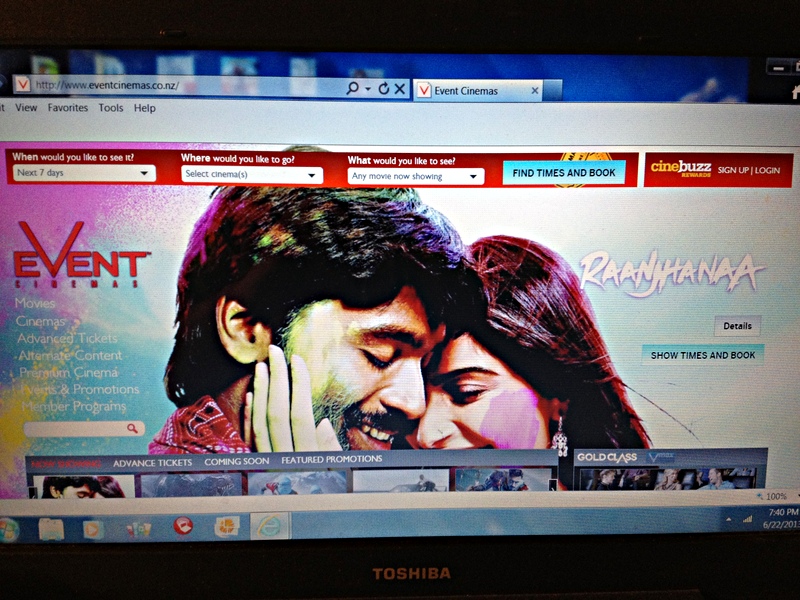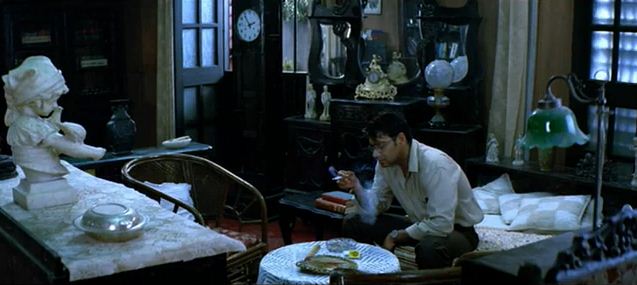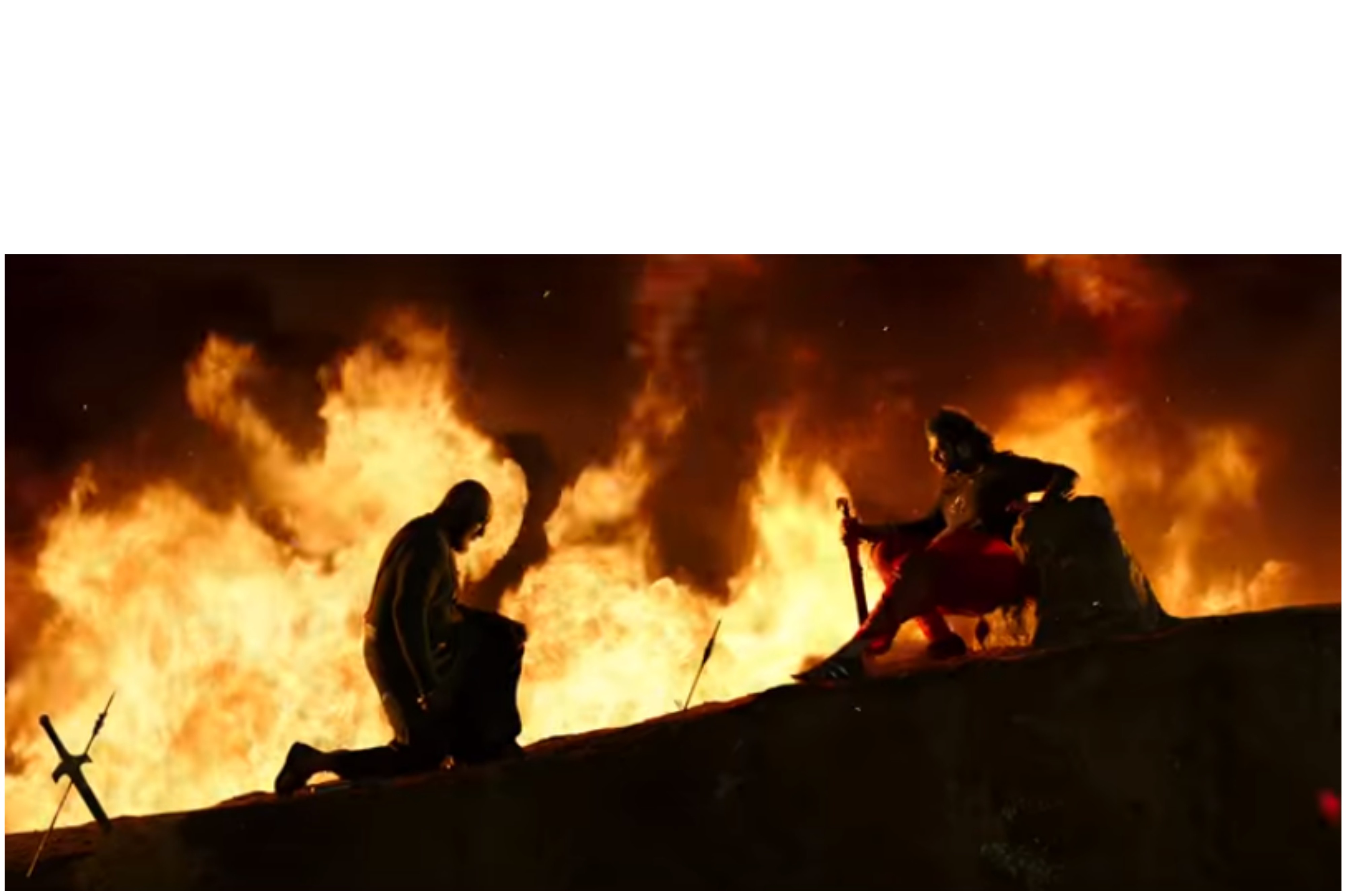Raanjhanaa
Life goes by fast, and this is especially so in retrospect. Things have a knack of creeping up on you. Childhood speeds by, girls get pregnant, boys get hitched, jobs are somehow handled, families are raised, political challenges steam-roller past and then the time arrives when the worlds on the other side of death interest even the minds of those who were never spiritual to begin with. As for my recent Saturday evening, the events were less expansive in scope but things certainly got snappier. I did not even know that a film named Raanjhana was in existence, my friend Rajeev called up and brought me up to speed, I checked that it had received favourable feedback, and in the wink of a keen eye, we were watching a promising Hindi movie in an overseas house-full theatre, with a jauntily involved crowd which quite unusually had a Pan-Indian representation.
Whatever problems Ranjhanaa might face in the box-office due to its audacious script, the movie hedges its bets smartly by introducing Tamil super-star Dhanush in a Hindi movie and by marrying his presence with spunky young Mumbai-Punjabi belle Sonam Kapoor. Both South and North Indian audiences are thereby tempted to see the movie (it is interesting to note that Sonam Kapoor looks very much like how Shruti Hassan did in the world-wide smash-hit song Kolaveri Di which toplined Dhanush). Talented writer Himanshu Sharma and powerhouse director Aanand L. Rai join forces again and give us a youngsters’ love story, in which love is a constant casualty. The romance in the first half, with all kinds of politics in the second act, takes off wonderfully, rolls with the punches, and displays fertile imagination before choosing an ending that is as bold as it is satisfying. Regrettably the last quarter fails to show us supreme script-writing, otherwise this would have been a truly rare, outstanding film.
Opting for a circular story structure, and often shuffling timelines, Ranjhanaa kicks off with a spunky kid in priestly garb and cooling glasses who scampers through the streets of Benares, mouthing sparkling cute dialogue and only stopping to chew on the scenery after spotting his seven year old Mehbooba performing Namaaz. Love blooms in the fertile dung of Benares. The snafu is that he’s a Hindu and of priestly pedigree to boot, whereas she is to the mosque born. Their adult roles are enacted by Dhanush (playing Kundan) and Sonam (Zoya). Impishly mischievous, Kundan is thin and dark-complexioned, with mediocre looks, average height, and middle class credentials. Realizing that he can’t slog like every workman-like Romeo in town, he decides to take a dynamic route often favoured by Tamil film heroes. In trying to impress Zoya who is not interested in him, with religion being a further barrier, Kundan goes ballistic by jumping into moving autos, liberally issuing romantic poetry, getting repeatedly slapped (by Zoya) to the point of masochism, then smiling, grinning and breaking into jigs through it all and ultimately slashing his wrists until Zoya, scared witless by his antics, caves in.
But thorns are obliged to sprout. Her outraged father intervenes, she is sent away, Delhi’s university campus enters the fray, a handsome hugely popular romantic competitor is thrown in and Kundan is buffeted to a juncture where he jumps into a political party’s quagmire in order to win Zoya over. But this time, Zoya (who has become a woman who is shockingly insensitive, free-spirited, and altruistic by turns) is traumatized to the point where she is not sure whether to accept, ignore or hurt Kundan.
Ranjhanaa thus sets up a formidably riveting challenge. A good-looking girl goes out into the big bad world, falls in love with a handsome mass-leader, and on coming back to the small-town, how will she be able to re-orient her feelings towards a boy of undistinguished achievement, and who moreover looks like an urchin? (with apologies to Dhanush). Since the film features more than a smidgen of maturity and intelligence, we further warm up to this uphill ask. Writer Himashui Sharma, however, is not able to fully shoulder the demands and intricacies of this onerous task.
The film's strongest asset is its script which is driven both by character and plot. The male protagonist tirelessly tries for his girl, stops the mission when it is pointless, resumes it when chances are resurrected, falls prey to crucial flaws and then gets up to gun for redemption, and ultimately is beset by so many indignities that he becomes more the underdog than the hero.
There's a shot in which Kundan, clad in the orange bride-groom's coat, wraps his arms around himself, breaks down and sobs grievously - it is a great moment in cinema - wherein Kundan enshrines himself as the patron saint of all those who have lost their lady love and are obliged to marry someone else.
Dialogues sport countless one-liners admixed with expletives that had the crowd regularly cheering in the first half, but became noticeably subdued in the second half, because both the story and the dialogues had lost a good deal of steam by then. What eventually ensues in the aftermath of a mob attack, comes off as an easy escapist scripting choice. As a major plus point though, associate players are given good coverage. Mohammad Zeeshan Ayub plays Kundan’s pig-tailed loyal friend Murari. He is given limited screen time, but has a plethora of snappy wicked one-liners which he mouths with street-chutzpah.
With 'Ranjhaana', Dhanush seeks to make an entry into an industry that heavily favours film heroes who are handsome, fair and North Indian - he has none of those attributes. But he is the emotional counterpart of Bruce Lee (and bears a passing resemblance to the latter). In his bid to go pan-national, he is generously helped by director Anand Rai and writer Himanshu Sharma. As the unfazed charming Romeo who soldiers on despite multplie failed attempts, he is impressive in the first half , but as an emerging influential politician in the next act, he only ends up ticking the basic requirements of the role. We see neither the gravitas nor the authority which would have made Kundan a formidable man of further complexity. Those who do not know his CV may note that Selvaraghavan directed him and Sonia Aggarwal in a Tamil film - Kadhal Kondaen - a love story with devastating impact (cf. 7/G Rainbow Colony). Dhanush will have to contend with the fact that the comparatively pusillanimous Hindi film audience finds it difficult to stomach the extreme stories and challenging endings that Tamil audiences tolerate and even reward.
Sonam Kapoor’s role here is one in which the actress has to improvize the greatness on her own. Though Kapoor is competent she is yet to show us those beautifully complex facets of emotional depth and poignant charge. I will repeat here Roger Ebert’s observation, of a child prodigy who played Chopin for a show and was later told "You can play the notes. Someday, you may be able to play the music". Swara Bhaskar, meanwhile, as the spunky much-abused young woman who loves Kundan to a fault, is an animated pleasure to watch, and continues to carve a niche as a high-quality character actress.
A R Rahman, the greatest music director ever produced by the greatest music-composing nation ever, may not have given us a fabulous roster of songs this time but here he shows that even a tier-two Rahman is profoundly groovy. The songs (the better ones are Tum Tak, Banarasiya, Raanjana hua, Tu Mun Shudi & Piya Milenge) are a breezy, eclectic, often inspired mix of modern melodies - jazz, folk, rock, ballad - while the background music has beautiful desi touches and exquisite international influences.
Vishal Sinha and Nataraja Subramanian’s camera may not have high-resolution images but it shows a commendable standard in composing big canvases, be it cramped Benares lanes or wintry Delhi-scapes.
Raanjhanaa in sum is an good unpredictable romance with partly 'filmy', partly realistic shades that are unafraid to take on messy socio-political overtones. Its daring turns in the concluding stages come at the end of some underwhelming dabble in politics and elections, but effervescent romance and light-handed charm in the first half carry the film through. Dhanush has made a good first move, but a tour de force would have served him better.
UPN
UPNWORLD welcomes your comments.










0 COMMENTS
WRITE COMMENT